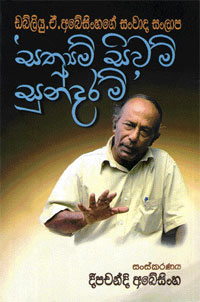Truth is beautiful

The book titled as Satyam Shivam, Sundaram, a compilation of
interviews with the senior writer and translator Dr W A Abeysinghe may
sound exhilarating from various points of view. The interviews have
appeared, covering a period from 1986 to 2010, in quite a number of
Sinhala daily and weekend newspapers, especially literary supplements.
The collection is compiled by Dr Abeysinghe’s daughter Dipachandi
Abeysinghe, who was also attached to the tutorial staff of Rajarata
University sometime ago. This I felt is a task of virtue and affection
as well as a service scholarly fulfilled.
The compilation covers 53 interviews and a convocation address of
Abeysinghe when he was awarded the DLitt by Vayamba University. Some
interviews emphasize the function of the present day university and the
need to gauge the very factor known as ‘knowledge’, which is written
with deep insights of current trends.

Being a stalwart in the field of translation, creative writing,
literary criticism and lyric writing Abeysinghe is seen as a clearly
visible person full of social activities. According to evidence evinced
in this work, the reader can observe how hard he had ascended the ladder
of his writing career with difficulties. It reminds self studied and
disciplined scholars, a specimen hard to find.
Abeysinghe had been a training teacher who had later sat for a
degree, after which he took up legal studies achieving the status of an
attorney at law. Then we also see how he spent his time in party
politics and journalism which had taught him bitter and sweet lessons.
One foremost lesson is grave disillusionment in party politics. He
renarrates this disillusionment. That is, Abeysinghe has realized, the
conflict between culture and politics where the latter must not
over-pervade the cultural nuances of a nation. As a multi faceted holder
of social positions, Abeysinghe too had the chance of being the State
Literary Panel Chairman twice and the National Library Services Board
Chairman.
He tried his best to be aloof from politics, but, he states in the
interviews, quite the opposite happened. But he stresses he never
stooped down to the level of misjudging literary values as it normally
happens today.
Abeysinghe declares he was never ever sorry for not clinging on to
some of those positions as expected by his well wishers. What he
pinpoints is that he wants to be as far as possible to find time to
devote himself for reading and writing, which he has cultivated from
childhood days. Being questioned on some of his drawbacks, Abeysinghe
seems to feel easy and not regretting, for he has still not given up the
never ending long journey of writing process.
As a general reader I felt Abeysighe is a strong attacker on the
university academia. He sees most so-called literary masters of language
and literature are engrossed in wasting time on good for nothing
activities like tuition that bring them lots of money and threshold
fame.
Instead he believes they all must be committed to academic
activities. In short culture, academic and media scene should be
changed. The culture should be geared to a rediscovery. His tone is not
harsh at all, but polite and serene. He visualizes the bureaucratic
tendencies in the culture vulturism will end up in chaos. As such he
anticipates a welcome variant to the existing pattern.
The interviews deal with various global issues as well.
For a contemporary student of communication and literature this
compilation is a gift to rethink their role in many ways. He sees the
absence of the critic in wider perspective and finds reasons for the
extant state. Abeysinghe too presents details regarding his travels
abroad, especially to Soviet Russia. These travels have helped him
change his outlook.
One salient factor is Abeysinghe is a much wanted person in mass
media. He always has a point to make. When a media interviewer asks him
whether he had got some literary positions like chairman, his response
is shown as relaxed. While admitting he is wanted by the politicians and
as such the requests initially come from them, he points out that
rejections too come from these very same quarters. This may be a certain
type of political game.
The series of interviews could be read from any page the reader likes
no matter where one starts. This is an embodiment of realities.
[email protected] |



